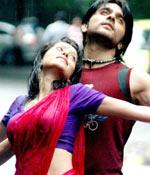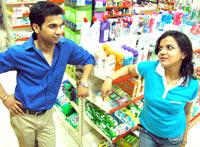 I've had some interesting conversations about cinematic realism in the last few days, and the point of entry has usually been Dibakar Banerjee's Love, Sex aur Dhokha.
I've had some interesting conversations about cinematic realism in the last few days, and the point of entry has usually been Dibakar Banerjee's Love, Sex aur Dhokha.
It's a hugely stimulating film; I've just seen it a second time and I can't wait to see it again. But when I hear people praise it mainly on the grounds that it's 'realistic', alarm bells go off in my head.
In a medium like cinema, the very idea of realism can be highly misunderstood or simplified. A quick illustration.
LSD's second segment, shown entirely through the CCTVs in a departmental store, is an unusual way of telling a story, well-executed, and it looks stark and minimalist in the Dogme 95 style.
But what does it mean exactly to say that it's 'real'? If it is, why do we clearly hear every word spoken by the characters? (An Indian store of the sort shown here wouldn't have a security system with high-quality digital audio.) Where does that lilting background score come from in the shot where characters from the first segment make a brief appearance? Why is all the key action conveniently set right in front of a security camera?
This isn't meant as criticism -- I'm just saying that any movie has a basic artifice built into the process of its creation. A human invention, the camera, is used in various pre-planned ways to capture a series of events, which are then projected at an optimum rate of frames per second to simulate movement.
Many different elements go into making a film, and often a particular scene becomes credible because of one of those elements, working in near-isolation. Take the climax of A Wednesday, where the Common Man delivers a monologue about vigilante justice.
Naseeruddin Shah's performance brought a grounded, believable quality to this scene, even though 1) the camerawork was flashy, and 2) on paper, the monologue was somewhat trite.
 If a lesser actor had played the scene, it might have seemed embarrassingly fake. Indeed, it's tempting to set up a dichotomy between an actor like Shah (known for submerging himself in his characters) and someone like Shah Rukh Khan, who is often accused of being himself in every film.
If a lesser actor had played the scene, it might have seemed embarrassingly fake. Indeed, it's tempting to set up a dichotomy between an actor like Shah (known for submerging himself in his characters) and someone like Shah Rukh Khan, who is often accused of being himself in every film.
But even this is a simplified contrast. Much as I admired Shah in A Wednesday, I never once 'forgot' who was playing the part. How could I? I've been watching him for decades.
There's a whole set of past associations to draw on. He may not be a superstar, but he's still a high-profile celebrity compared to the talented youngsters of LSD.
So does that make the latter's performances even more 'believable'? After all, most of us watch the film knowing nothing about them (that might change if you read the lead story on this page!) and we can think of them simply as the characters.
But consider this: if even one of them goes on to a successful Bollywood career, it will be impossible to watch LSD again and experience that same sense of 'authenticity'.
Why should it matter so much anyway? I'm puzzled by the commonly held belief that Realism (defined in the narrowest sense) is automatically a superior mode of artistic expression.
This idea is prevalent among readers too: it's the reason why many people think that you read novels for 'entertainment' while you read non-fiction to be 'educated'.
It's responsible for the condescension directed at genres like science-fiction and fantasy, and the notion that a movie 'based on a true story' is necessarily respectable.
In this limited worldview, the surface is all that matters. But good films, like any good art, deserve to be appreciated for the deeper, more poetic truths that they can offer us, and for the way they use the many techniques available to them.











